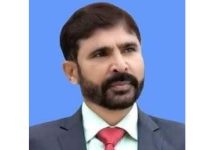Dr M Ali Hamza
In response to Israel’s strike in Qatar; an attack that targeted senior Hamas leaders who were meeting to deliberate on a United States-backed ceasefire proposal, Doha witnessed an extraordinary Emergency Arab-Islamic Summit. More than 50Muslim majority states gathered under one roof, their leaders united in condemning Israel’s unprecedented escalation with the strongest possible words.
Before we start speculating about the potential outcomes of this summit, it is worth pausing for a reminder: the Organization of Islamic Countries (OIC) has a long history of passionate statements but little to show in terms of strategic or practical measures to halt aggression. Over the past several decades, from Palestine to Iraq, from Afghanistan to Libya, the collective voice of Muslim-majority countries has rarely translated into collective action.This pattern raises an urgent question: will Doha summit mark a turning point, or will it simply add another chapter to archive of rhetorical outrage of Muslim majority countries without consequence?
For more than seven decades, the Muslim world has been at the receiving end of wars, invasions, and occupations often driven or supported by Israel, the United States, or Western powers. Muslim-majority countries have witnessed repeated assaults under the banners of “security,” “counter-terrorism,” or “spreading democracy.” Yet, a recurring question looms: has the collective voice of the Muslim world, embodied in the OIC ever truly shaped global accountability, particularly at the United Nations?Let’s dive into history.
The story begins with 1948, when the creation of Israel led to mass displacement and wars that followed in 1967 and 1973. Israel’s occupation of Palestinian lands remains one of the longest-running injustices of modern history. Despite OIC’s formation in 1969, largely in response to the burning of Al-Aqsa Mosque, its role has mostly been rhetorical; issuing statements, hosting summits, and passing resolutions. Rarely has it translated into real political leverage at the UN Security Council.
Consider the US-led invasion of Iraq in 2003, conducted without explicit UN approval. Millions of Muslims saw Baghdad fall and civilian lives destroyed, yet the OIC’s response was limited to condemning the war and calling for restraint. The organization could not muster the political weight to influence UN sanctions against the US or its allies. Similarly, in Afghanistan (2001), the OIC had little more than a humanitarian voice.
OIC has consistently demanded UN sanctions and accountability for settlements, bombings, and human rights violations by Israel. Its not the first time but in 1981, the OIC proposed suspending Israel from the UN, but this never materialized. In contrast, the OIC did manage to push for the 2004 UN advisory opinion that declared Israel’s separation wall illegal, but even that ruling lacked enforcement power.
Muslim majority counties are largely been reduced to a toothless talk shop issuing statements that vanish into the air while bombs fall on Muslim cities. The time for symbolic outrage is over; what is needed now is strategy, unity, and action. So, what to do?
First, financial muscle. Sovereign wealth funds from the Gulf States, Türkiye, Indonesia and Malaysia together control trillions of dollars. These could be redirected away from Western defence industries and instead invested in creating independent military, technological, and media capabilities across the Muslim world. As long as Muslim nations fund Western economies while pleading for justice, insincerity will remain the order of the day.
Second, economic leverage. Muslim countries collectively control over 70% of the world’s proven oil reserves and are major suppliers of natural gas. In the 1973 Arab-Israel war, Arab states imposed an oil embargo, shaking Western economies to their core and forcing Washington to recalibrate its Middle East policy. That episode alone proves the West cannot simply ignore Muslim nations if they act in unison. Why hasn’t the OIC revived such leverage in the face of ongoing Israeli atrocities in Gaza or US interventions elsewhere? The answer is an open secret, because Muslim countries lack scientific supremacy, strategic planning and Arab-Ajam unity. Anyhow, a coordinated energy policy could instantly turn Muslim outrage into real pressure.
Third, legal warfare. Israel’s repeated violations of international lawfrom illegal settlements to collective punishment in Gazaare well documented. OIC nations should pool resources to pursue cases in the International Criminal Court and the International Court of Justice with relentless persistence. South Africa’s recent ICJ case against Israel shows what is possible when courage replaces timidity.
Fourth, collective defence. NATO exists to protect Western interests. Why hasn’t the OIC created even a minimal joint defence mechanism? Though a few years ago, Saudi Arabia spearheaded the formation of the Islamic Military Counter Terrorism Coalition (IMCTC), often dubbed a “Muslim NATO,” uniting over 40 Muslim-majority nations. Its stated aim was counterterrorism and collective security, but the alliance struggled with internal divisions, unclear objectives, and limited practical military coordination. Thus,a uniteddeterrent force, would alter the calculus of any aggressor.
Finally, Muslim-majority countries must urgently recalibrate their diplomatic strategies by aligning with emerging power blocs like China, Russia, and the Shanghai Cooperation Organization (SCO). Building stronger ties with non-Western alliances can create new avenues of support at the UN, dilute US and Israel dominance. By diversifying allianceswhether through BRICS, SCO, or Belt and Road partnershipsMuslim states can transform their diplomatic isolation into collective bargaining power.
History has shown that Western powers and Israel only respond to costs, not condemnations. If the Muslim world wants to stop being a perpetual victim, it must wield its oil, money, laws, and armies with purpose. Until then, Israel and other aggressors will continue to act with impunity, while the voice of Muslim majority countries remains more echo than action.

















